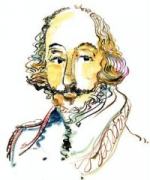|
This section contains 16,397 words (approx. 55 pages at 300 words per page) |

|
SOURCE: “Ideological Conflict, Alternative Plots, and the Problem of Historical Causation,” in Stages of History: Shakespeare's English Chronicles, Cornell University Press, 1990, pp. 40-85.
In the following essay, Rackin identifies a conflict between two Renaissance theories of history, providentialism and Machiavellianism, as alternate explanations of historical causation. This conflict, maintains Rackin, can be found in Shakespeare's history plays, and it is the source of their theatrical energy and the inspiration for the audience's contemplation of the problems related to historical interpretation. Rackin goes on to investigate how this ideological conflict is portrayed in different ways in the history plays.
Modern criticism of Shakespeare's history plays can be divided conveniently into two main camps, both concerned with the problem of historical causation. First there was the “Tudor myth” school associated with E. M. W. Tillyard, which found in the plays “a universally held,” and “fundamentally religious” historical “scheme,” governed by...
|
This section contains 16,397 words (approx. 55 pages at 300 words per page) |

|


